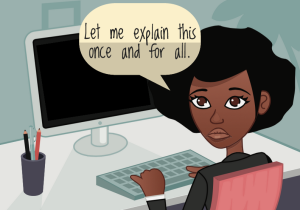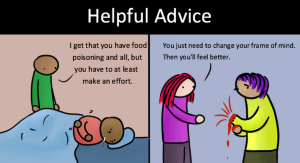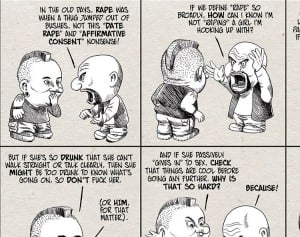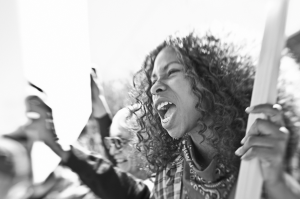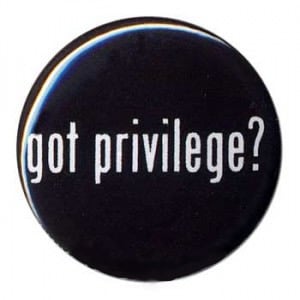
A person sitting down hands their credit card over while gazing intently at someone who is standing to take the card.
I spent many years viewing women as objects of my affection rather than complex people with feelings, wants, and needs of their own.
While it doesn’t excuse my behavior, I was taught at a very early age to view women as prizes to win. The belief that women are trophies still permeates through our culture, whether it’s in the media, education, or simple everyday conversation.
When we’re taught that an entire gender exists purely to satisfy others’ needs, it dehumanizes millions of people, and it’s very difficult to have empathy for someone that you don’t view as a real person.
It encourages the objectification of women because we’re so frequently represented as rewards for men who vie for us even though our desires are rarely – if ever – taken into consideration.
It wasn’t until I actually inquired about the lives of women that I realized I had been dehumanizing and objectifying women for many years.
I was initially shocked by my mindset, as I had always prided myself in not being someone who would ever partake in blatant sexism; however, the objectification of women is so pervasive that I wasn’t even aware that I was complicit in it.
It’s very likely that there are many people, particularly men, who don’t realize that they’re perpetuating a culture that dehumanizes and objectifies women.
And I want to talk about that.
So, here are some ways that women are objectified in everyday ways – and why it’s harmful.
1. Media Teaches Us That Women Should Be Vied For
My first memory of where I learned to objectify women started while watching the sitcom Family Matters, where the character Laura Winslow is Steve Urkel’s love interest.
“Love interest” is putting it lightly, though. She’s more like his obsession. His insistence on repeatedly pushing himself into her life is represented as charming, cute, and nerdy. In reality, it’s destructive, objectifying, and dehumanizing.
Unfortunately, when I was growing up, the vast majority of TV shows had this trope: a man is in love with a woman, and her function is simply to be his love interest.
As a child with a malleable brain, I spent decades viewing women in this manner. I thought women were simply the plot devices in my life with no personalities. I viewed them as extensions of my own ego, just like I was taught, rather than people with minds of their own.
I can remember countless times when I’d say something flirtatious to a female friend and she wouldn’t respond, and I was convinced that she either didn’t hear me or didn’t understand that I was flirting with her.
So, embarrassingly, I would try harder to get her attention. This, of course, eventually cost me several friendships. And in hindsight, those women were right in cutting off communication with me.
This was partially due to an old TV sitcom trope where a man will throw a sexual innuendo at a woman, and the “joke” is that she’s completely unaware of what’s happening. She’ll either be staring off into space or not paying attention, and she’ll look up and ask, “What did you say?”
And the man will respond, “Oh, nothing, I didn’t say anything.” This is followed up by laughter from the studio audience, which to me was affirmation that women are completely oblivious to men’s advances.
In essence, women operated as empty vessels for men to project their wants and needs onto.
In these TV shows (and also many comedy movies), it’s a rarity for men to inquire about the women’s wants and needs. I don’t know many (or any, honestly) scenes when a man ever makes an effort to even get to know a woman on any level that recognizes her humanity and autonomy.
When women are represented this way, it encourages men to mistreat and disregard them – or to treat them as comedy fodder – because the perception is that they aren’t bright enough to know what’s going on anyway.
Perhaps even more destructive is that it encourages men to be more aggressive when women are not acting the way they “should” be acting, when they aren’t responding in the way men would like them to respond. This is coercive, controlling, and wholly damaging to an entire gender.
People should be treated with respect and empathy, not dehumanized and objectified, and we need to be better about representing women more positively in television and media.
Women should be represented as the well-rounded people that they are, not empty plot devices.
2. Children Are Encouraged to Follow Rigid Gender Roles in School
When I was a teenager, a huge part of high school was the dances.
Gossip would travel as students would discuss which boy asked which girl to the dance. And the presumption was that it was always up to the boys to be proactive, while girls would pick the suitor that she liked the best.
The rigid gender roles were already in place, and we were all just playing our parts.
The gender roles became even more evident with the Sadie Hawkins Dance, where the girls would ask the boys. While this may seem like a good idea in theory, it further proved that “girls asking boys” was an anomaly and not to be encouraged outside of this context.
Girls who asked boys to other dances – or any other dates – were viewed as aggressive and/or desperate, so they were largely silenced from voicing their wants and needs. I believe that this mentality carries into adulthood.
I remember many instances – years before my transition into a woman – when my classmates of all genders would encourage me to ask girls out. When I would proclaim that I was either too scared or wasn’t interested in asking anyone out, I was mocked for not being “man enough.” I was told to “stop acting like a girl.” I wasn’t aggressive enough to their satisfaction.
I believe this does a lot of long-term damage to the way that men view women, as the constant insistences to “ask women out” doesn’t stop in high school. And with women being taught to be silent about their wants and needs, it makes for a damaging combination where men begin viewing women as “numbers,” as ideas, and as objects, and women are discouraged to speak out against it.
In instances when women speak out against being treated as objects, some men build resentment – because they feel like women aren’t operating in their roles correctly.
This is largely why so many men take rejection so harshly. They feel like failures, because their role is to be proactive and pursue women, and when they’re told “no,” it’s a rejection of their manhood.
Since they don’t realize that they’ve been taught toxic ideas from a young age, they believe that women are the ones to blame for not following a script.
In reality, it’s due to our culture reinforcing damaging stereotypes that hurt everybody in the end.
3. Cisheteronormative Language Discourages People to Be Anything Other Than What Their Gender Roles Prescribe
Everyday cisheteronormative language – the way that we speak that presumes that all people are cisgender and straight – is domineering and exclusionary, and it discourages people from acting outside of their roles.
When we discuss gender, there’s still a presumption that people are either 100% male or 100% female, even though there are dozens of different genders. We simply say “men” and “women,” which is very restricting and limiting language.
We still say “ladies and gentlemen” instead of “folks.”
When someone is pregnant, the first question we ask is, “Are you having a boy or a girl?” Before the child is even born, their gender is already predetermined.
This cisheteronormative language also excludes intersex, non-binary, agender, and transgender people – along with many other groups and people – from the conversation.
In addition to the presumption of gender, there is still an assumption that everybody is straight.
When I hear parents talking to their children, they still ask (assuming their children are cisgender) the boys are asked if they’re interested in any girls, and the girls are asked if they’re interested in any boys. This plants the seed in children’s brains that being heterosexual and cisgender is “normal,” while anything else is strange and/or abnormal.
It’s ingrained in our language.
My father, in particular, was livid when I acted feminine as a child. He informed me that since I was “his son,” I was to never act “girly” because it was “gay.”
It didn’t matter to him that I was attracted to other women. He used “gay” to mean “feminine” because there weren’t any other words for him to describe my behavior, and he saw femininity as an inherently weak quality.
He believed that the only function of femininity was attracting men. He told me that since I was his “son,” I was going to be the head of the family – because that was my role, and any type of femininity would go against his perception of what a “leader” should be.
Conversely, other members of my family would badmouth their friends’ daughters who dared to become ambitious and work for a living, stating that it’s not “attractive” when women strive for more.
Women were supposed to be dutiful homemakers who supported their husbands and remain in the background like props.
Because of these reasons, coming out as a transgender woman to my parents was very difficult because I didn’t (and still don’t) have the language to fully articulate to them what I’m going through. Due to our limiting exclusionary language, the best they can do to comprehend my existence is to think of me as “a boy who likes to look pretty.”
However, it’s not just my family that thinks this way. When people find out that I’m a transgender woman, they automatically assume that I’m interested in men. They’re almost always shocked to find that I have a girlfriend (almost like they don’t believe lesbians exist).
They think that because I wear what is typically considered feminine clothing, I must be doing it primarily to attract men. They even take it as an invitation to send me inappropriate private messages.
In fact, one of the most common cisheteronormative premises in standup comedy is male comics telling the women in the audience, “You don’t have to wear makeup; we’ll sleep with you anyway,” as if everything women do is for them and for their attention. It doesn’t occur to them that they could be doing it for themselves.
All of these limiting ways of addressing people simply reinforces the damaging gender roles already in place. Unless a perceived 100% male is seeking out a perceived 100% female, many people still feel discomfort because they don’t have the language to know how to address it.
We need to stop automatically assuming that someone is straight and cisgender. We need to learn how to expand our vocabulary and use more inclusive language so that we can expand the way we speak about and think about other folks.
I believe if we made these simple shifts in language, people will be encouraged to live more freely instead of fitting into the roles that restrictive language has put them in.
4. Men Are Encouraged to Believe That Women Are Their Property
To further illustrate the damaging effects of TV tropes where men vie for women (as discussed in section one), women are literally perceived as pieces of property that can be won, and this mentality can do significant damage to women.
If you view people as “property,” there’s a subconscious feeling that you can do whatever you want to them because you don’t consider them fully formed human beings. For example, if you own a product like a cell phone and the phone doesn’t function the way you want it to, you might throw it due to frustration.
The same theory applies to women when they are viewed as property. When they aren’t “acting accordingly,” unfortunately, they can become more susceptible to abuse from their partners – and victim-blaming from others.
There are outcries doubting women when they’re abused, because many people hold an underlying resentment that the women deserved what happened to them because they weren’t acting the way they were supposed to.
Whenever a news story comes out about a man’s horrific abuse against a woman, many Internet commenters talk about her like she’s an object that disobeyed orders – especially if she ever dares to speak out against injustices or stand up for herself. Quickly, the conversation turns into the damage she is doing to the man’s reputation as a result of her having the audacity to act like a human being.
As a result, the conversation about abuse generally centers around men and the anger and/or embarrassment they feel about how their partners acted, while the horrible mistreatment of women is either dismissed as a secondary concern or ignored completely.
It creates a lack of empathy for women, because they have been reduced to plot devices, objects, and extensions of somebody else.
This type of mentality needs to change. When women are attacked, people need to remember that these are human beings who are being attacked, and it should be universally unacceptable behavior.
And it should be universally unacceptable behavior because they’re real people with real feelings, not just products that have to act a certain way.
***
From a very early age, we’re taught stereotypes and roles to fill in order to maintain control and order in society. By doing so, we continue cycles that have been doing damage for decades.
We need to be better about educating people at an early age about the dangers of perpetuating the gender roles, and we need to pinpoint all of the subtle ways that society pushes these ideas forth.
It bears repeating, even though it should be obvious, that women are real people and don’t merely exist for other people’s enjoyment. These harmful perceptions of women need to change, and we need to be better as a society and stop perpetuating the cycle of harmful ideas.
[do_widget id=’text-101′]
Robin Tran is a Contributing Writer for Everyday Feminism. She is a standup comedian and blogger, and she holds a BA in English from UC Irvine. In early 2015, Robin came out as transgender woman and has written about her firsthand experiences ever since. She has performed at the Improv, Mad House Comedy Club, and the Comedy Palace, and her articles have been published in xoJane and Time.com.
Search our 3000+ articles!
Read our articles about:
Our online racial justice training
Used by hundreds of universities, non-profits, and businesses.
Click to learn more





